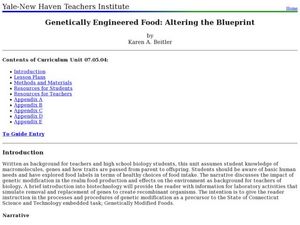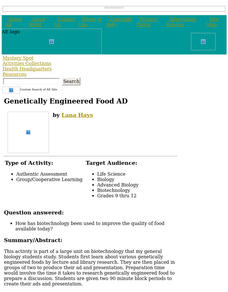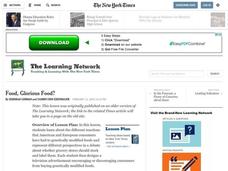Curated OER
Genetically Modified Food (GMF)
Explore genetically modified foods through various experiments. In this biology instructional activity, students discuss the safety issues related to GMF's. They conduct a PCR analysis to identify the presence of genetic modification.
Curated OER
Genetically Engineered Food: Altering the Blueprint
Students explore the genetic engineering of food. In this health lesson students explain how DNA technology can be used to produce food.
Curated OER
Genetically Engineered Food AD
Students examine various genetically engineered foods by lecture and library research. They are then placed in groups of two to produce their ad and make a presentation on a food they have developed.
Curated OER
Genetically-Modified Food
Students investigate the pros and cons of genetic engineering. They watch a short Bill Moyers video, conduct Internet research, create a poster, participate in a pro/con debate, and write an essay expressing their personal feelings on...
Foreign Policy Association
U.S. and Europe Online Lesson Plan
Class groups investigate the economic and political implications of a country's policies on genetically modified foods, craft a position paper detailing that policy, and share their findings with the class. Armed with this information,...
Curated OER
Green Genes: Genetically Modified Organisms in Our Food
Students investigate how and why genetically modified organisms are used as food crops. They identify the advantages and disadvantages of these crops through internet research then present their views and discuss them as a large group.
Curated OER
KORN-TV Newsroom
Role-play to learn. Writers pretend to be a team of news writers. They research information about genetically engineered corn and the impact of biotech food products. Then create a video, Powerpoint, or oral presentation to present their...
Curated OER
Food, Glorious Food?
How are the reactions between American and European consumers different when it comes to genetically modified foods? Use the New York Times article "Consumers in Europe Resist Gene-Altered Foods" to inform your middle schoolers about the...
Curated OER
Genetic Engineering of Crop Plants
Students explore genetic engineering and it biological and ethical implications. By conducting experiments with genetically engineered corn and plain corn they determine the difference in taste. Students also discover the effects of...
Curated OER
Regents High School Examination: Living Environment 2010
This exam touches upon every topic within the typical first year biology course.. A broad variety of question styles give high schoolers every opportunity to show what they know. Why start from scratch when a comprehensive final exam is...
Curated OER
What is Biotechnology?
Young consumers explore the concept of biotechnology as it pertains to the foods they eat, economics, and agriculture. They watch several videos, explore a website, complete worksheets, and engage in class discussion. Son they'll know...
Agriculture in the Classroom
Farmland: GMOs and Organic Agriculture
Learn more about genetic modification, organic farming, and the role of biotechnology in agriculture by watching a documentary that shows how newly gained knowledge can be applied to specific situations involving farmers and the choices...
Curated OER
Biotechnology, GMOs and Food
Twelfth graders explore controversy around genetically modified foods, identify source of controversy, and role play town hall meeting on genetically modified foods, to examine viewpoints and arguments for and against genetic modification.
Curated OER
Edible GMOs?
The debate over genetically modified organisms is on! Young biologists imagine that they have been asked to choose which corn chips will be sold for a fundraiser, one made with GMOs or one without. This four-day lesson plan requires...
Curated OER
Altered Genes
Students describe the economic relationship between farmers, consumers, and food companies. They examine the issues regarding the reactions of consumers in this country and other countries to the use of gene-altered crops in food...
Curated OER
Biology Trivia Questions
Students answer 71 questions about a variety of topics in biology. For this biology trivia lesson plan, students use the internet to find the answer to questions about the systems of the body, their structures and functions, the...
Curated OER
I Feel Renewed!
Students participate in a simulation of the equal and unequal distribution of the earth's renewable resources. They discuss renewable resources and how food resources can increase and decrease, participate in the simulation, and analyze...
Curated OER
How To Make Yeast Cells Thrive
Students set up and run the experiments they designed in the instructional activity, 'Population Growth in Yeasts,' using simple yeast-molasses cultures in test tubes. They demonstrate understanding that several environmental factors can...
Chicago Botanic Garden
Calculating Your Carbon Footprint
Unplugging from technology for one day per week will decrease your carbon footprint—are you up to the challenge? Part two in a series of three allows individuals to explore their personal carbon footprints. By first taking a quiz at home...
Chicago Botanic Garden
Calculating Your Ecological Footprint
You can lower your ecological footprint by recycling! Lesson four in this series of five has individuals, through the use of a computer, calculate their ecological footprints. Through discussions and analysis they determine how many...





















